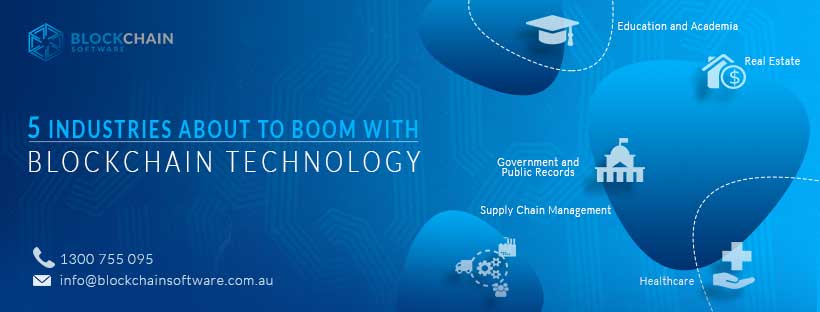5 INDUSTRIES ABOUT TO BOOM WITH BLOCKCHAIN TECHNOLOGY
27 Apr 2024

It's soon going to be a world of blockchain, and banking isn't the only industry that's going to be affected. There has been a lot of talk about how blockchain will be the most significant technological innovation of the decade. Discover how blockchain can be used in five major industries and how it can impact each of them.
BANKING
Consider sending $100 through a conventional bank to a friend. Since your bank charges a $10 fee, you can only send her $90. The transfer rates and other hidden fees will make her get even less if she's overseas. There is no guarantee that the process will be 100% secure - and the process is time-consuming and expensive.
As opposed to commercial banking, blockchain provides a low-fee, high-security peer-to-peer payment system that disrupts it. Central authorities are not necessary, so you won't pay for them. Isn't that awesome? In this way, a third party does not need to be involved in a cryptocurrency transaction, like Bitcoin or another. Each transaction you make with your friend is recorded in a ledger that can be viewed and reviewed by any cryptocurrency user - giving you a sense of true autonomy over your finances.
SUPPLY CHAIN MANAGEMENT
Blockchain technology can trace all the steps of a supply chain, so that, let’s say, you placed an order for food, had the food delivered, and found the food disgusting. The owner of the company from whom you ordered it could go back through his blockchain ledger and find out where in the supply chain the order went wrong to displease you. For example, he can go from the farmer to the producer, to the distributor, to the retailer, and then to you, the purchaser. In other words, in supply chain management, blockchain provides permanent transparency and validation of transactions shared by multiple supply chain partners. All transactions are permanent and verifiable, making it easy for an owner or a customer to view each record.
It can be used for any type of verification – for example, seafood verification, where it can track the seafood from ocean to market. The Pacific Tuna Project uses blockchain to manage fishing information, exporting/importing details, and purchasing details to track tuna fishing. This prevents illegal fishing.
REAL ESTATE
Real estate is an incredibly complex industry with a lot of moving parts. The participation of buyers, sellers, agents and brokers, and the processes of title and escrow make real estate transactions slow and potentially risky.
Blockchain can reduce that risk and increase trust in a number of ways. With home purchases, most people rely on title companies to verify real estate transactions and ownership. There has been much debate about how blockchain could solve this problem, but a recent Newsweek report detailing the example of a home title being issued on the Ethereum blockchain showed a solution: It's only a matter of time, the article said, before government agencies start embracing blockchain as a valid alternative to existing title processes.
GOVERNMENT
Blockchain technology can end voter fraud.
In a traditional voting process, most voters stand in line to cast votes or send in mail votes. Then, the votes must be counted by a local authority. Online voting is possible in this scenario, too, but as with all other industries we’ve discussed, because a central authority is used, problems of fraud arise
Using blockchain technology thus becomes the wisest choice. Here, people can vote online easily without revealing their identities. Using blockchain, officials can count votes with absolute accuracy, knowing that each ID can be attributed to only one vote. Fraud cannot occur because it is next to impossible with blockchain technology. And, once a vote is added to a ledger, it cannot be changed or erased.
Other government applications include digital asset registries, wherein the fast and secure registry of an asset such as a car, home or other property is needed; notary services, where a blockchain record can better verify the seal’s authenticity; and taxes, in which blockchain technology can make it easier to enable quicker tax payments, lower rates of tax fraud and have faster, easier audits.
HEALTHCARE
Let’s face it. Today, myriad problems exist in the storage of people’s health data. Anyone can have access to this very private information because it is all contained in centrally located files. When someone asks someone else for a person’s information, it can take hours for that person to locate the right file, offering opportunities for data breaches, theft or losses. That’s why blockchain technology in this industry is so important.
Blockchain technology here eliminates the need for a central authority and enables rapid access to data. Here, each block is connected to another block and distributed across the blockchain nodes, making it difficult for a hacker to corrupt the data. Keeping personal medical file information private is of the utmost concern, so blockchain technology makes the most sense, no?
